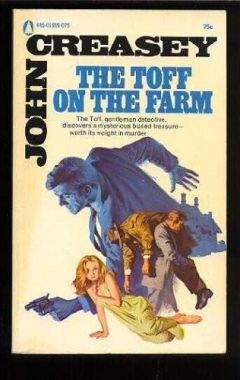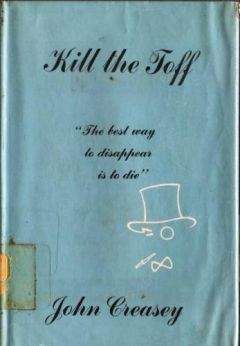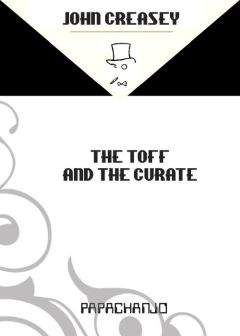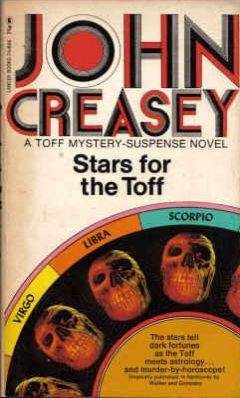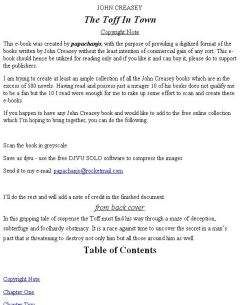John Creasey - The Toff and The Sleepy Cowboy
На электронном книжном портале my-library.info можно читать бесплатно книги онлайн без регистрации, в том числе John Creasey - The Toff and The Sleepy Cowboy. Жанр: Прочее издательство неизвестно, год 2004. В онлайн доступе вы получите полную версию книги с кратким содержанием для ознакомления, сможете читать аннотацию к книге (предисловие), увидеть рецензии тех, кто произведение уже прочитал и их экспертное мнение о прочитанном.
Кроме того, в библиотеке онлайн my-library.info вы найдете много новинок, которые заслуживают вашего внимания.
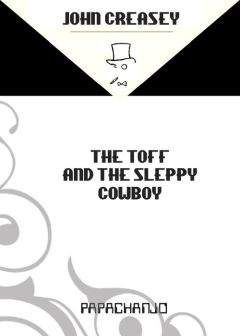
John Creasey - The Toff and The Sleepy Cowboy краткое содержание
The Toff and The Sleepy Cowboy читать онлайн бесплатно
“I should have known,” said Rollison.
He watched Grice’s expression when the policeman saw Pamela.
Obviously, it was one of recognition and there was a hint of surprise. Quite suddenly the others dropped into the background, while Grice and the girl looked at each other.
“Hallo, Miss Brown,” Grice said at last. “Is your father better?”
“Thank you, yes,” she said. “I didn’t realise you knew he’d been ill.”
“He was to have appeared as a witness in the South Western Court two days ago, and sent his apologies,” said Grice. “I thought you’d been laid low, too.”
“I was,” said Pamela, smiling brightly. “Down first, up first.”
“I must say it did you good,” said Grice drily. “Thank you, sir!”
“When this is over I shall want to know why you didn’t come to the Yard with the whole story,” Grice said, in a voice which he tried to make severe but did not wholly succeed.
“I’m sure Mr. Rollison will explain why,” Pamela retorted. She was radiant as she turned to Rollison, and bent over and kissed him warmly on both cheeks. “Richard, you’ve been an absolute darling. Thank you, thank you, thank you!”
She was gripping his hands tightly when Tommy said:
“I echo them there sentiments, Richard.”
He slid his arm through Pamela’s and they went off; Jolly, with his uncanny ability to see everything that went on in the flat at once, was at the door to show them out. Grice leaned against the big desk, his back to the trophies, and looked at Rollison with a smile in his eyes and on his lips.
“And a matchmaker too,” he teased.
“That young man is a much faster worker than he looks,” Rollison said. “So you know the Browns.”
“Very well. It’s a family team and they specialise in tracing ancestors, family trees and that kind of research although they have taken on divorce work and searched for missing persons.” Grice looked up as Jolly came in with coffee, cheese and biscuits on a tray — and the trifle, which looked most attractive in a cut glass bowl. “Rolly,” Grice went on. “I am told you were magnificent.”
Rollison waved his hands in silent disclaimer.
“And so will the newspapers, in the morning,” went on Grice. “My men tell me they’ve never known such a change in the attitude of the Press. At first they thought you’d gone too far and scared Effie King into the premature delivery and they half-thought you’d caused the fire at her place. Now —” He spread his hands. “Are you up to talking.”
“Not too long, sir, I beg you,” pleaded Jolly. “No, not too long,” Grice promised.
“Thank you. Will you have some trifle, sir?”
“Do you know, it looks so tempting I believe I will,” decided Grice, who had a notoriously sweet tooth despite his lean figure. “A little of that Cheshire cheese first, if I may.”
Jolly ministered. Rollison stuck to coffee, and Grice simply asked : “Tell me all you know, Rolly. And if Jolly could tape it — ?”
Rollison leaned back, eyes half-closed, and remem-bered from the beginning, so short a time and yet so long ago. Everything that had happened was vivid in his mind, and he related the story with great lucidity while Jolly sat at the big desk with two small transistor tape recorders taking down every word. When the story was told, up to the moment when he had come back here and nearly collapsed, the second recorder tape had been used up. There was a sharp click! as Jolly switched the machine off.
Grice, who had finished eating, poured himself another cup of coffee as he remarked:
“The Browns were ill, and I suppose they can’t be blamed for not coming to us about the old man’s fears. We would have thought it a cock-and-bull story until Loman arrived at Heath Row and trouble really began. Taken at its face value, someone was planning to have Loman impersonated by King, who has now disappeared.”
“That’s how it seems to be,” Rollison said. “And how it seemed once I knew the whole story.”
“And you suspect this man Hindle, the man who expected to inherit?”
“He’s an obvious suspect,” Rollison said. “Do you know where he is?”
“I know he was supposed to have moved to a hotel, as his flat was uninhabitable after the firemen had finished with it,” Grice said. “I’ll check. And I know that King’s wife Effiie has a son who is doing well. At seven pounds some ounces it doesn’t seem very premature! She hasn’t said a word and the doctor who attended her says she’s suffering from shock as well as natural after-birth weakness, but she could be putting on an act so as to avoid being asked to tell us where her husband is.”
“Yes,” Rollison agreed warmly. “Have you a police-woman with her?”
“No, but I shall have, after this. Rolly — one thing above all puzzles me.”
“I think I know what you mean,” said Rollison. “Why go on with these murderous attacks now that the cat’s out of the bag? No one could possibly hope to pull off the impersonation now. The first attempt at Kennedy Airport was viable, so was the one at Heath Row and even the attack on Rubicon House, because that destroyed the evidence that there is a planned impersonation. But tonight’s attack seemed motivated by sheer malice. Has the prisoner talked?” he asked Grice.
“He simply says he was paid to make all three attacks by a man he’s never seen — he gets his orders by telephone and knows the man only as A.M. There could be truth in this, and it will be difficult to prove he’s lying. He’s an ex-bomb disposal unit man who’s lived by blowing safes for a long time, one of the psychopathic bad ones, I’m afraid. We’ll keep trying but I doubt if we’ll get much more from him. Well!” Grice stood up, briskly. “I’ll go after Hindle and King, and if there are any results —”
“Let me know in the morning,” pleaded Rollison.
Grice laughed : “I won’t disturb you unless with epoch-making news! If I did, Jolly would never speak to me again, would you, Jolly?”
“No, sir,” said Jolly with quiet vehemence. “Shall I make a copy of these tapes and let you have them?”
“Please. I —”
Grice broke off when the telephone bell rang, and Jolly, nearest to the instrument on the big desk, picked up the receiver and announced: “This is Mr. Richard Rollison’s residence.”
There was a moment’s pause before he turned to Grice. “You are wanted back at the Station immediately, sir,” he said gravely. “No, sir, the sergeant didn’t say what for — only that it was a matter of utmost importance.”
15
Attack
PAMELA BROWN HAD NEVER been so happy.
She knew that ‘happy’ was the right word, although what she felt was a kind of exaltation; euphoria. When-ever she felt Tommy’s hands on her, it was as if an electric shock ran through her whole body. No one’s touch had affected her in anything like the same way. She had known there was something different about the American when she had first seen him, and within an hour knew that he mattered. She even had time to try to rationalise. It was because of the excitement, the nerve-racking things that had happened, the fact that everything and everyone involved seemed so much larger than life.
Rollison, for instance: the Toff.
And that incredible scene when the bomb had been thrown.
Everything.
In spite of what had happened, and the known dangers surrounding them, so much had seemed funny. Persuading the police to let them pass the cordon to get her car, for instance! Dozens of firemen were directing water on the flames, and the fire was under control, but steam and smoke and the fat, snaking hoses made a kind of Bedlam. Then Tommy had tried to get at the wheel of the little car, and could not get his knees under it! So she had had to drive and he had to squat on the back of his seat, long legs stretched out. They said silly things; laughed; even giggled. She drove carefully to avoid making him bump his head, and kept her wits about her enough to know that they were followed by two cars.
It was half-past eleven when she turned into the drive of her house.
She had been born here, in a room in the shade of the trees of Clapham Common. It was a big, Victorian house standing on a corner, overlooking the Common on one side and the corner house across the street on the other. One of her father’s prides was the shrubbery in the middle of the driveway; he, himself, clipped each laurel, rhododendron, privet and bush of every variety. Eric — her brother — took over only in emergency. Eric kept the grass trim and she looked after the flowers while her father was in sole charge of the small but fruitful vegetable garden behind the house.
As they had driven across Clapham Common, Tommy had been quiet almost for the first time, until he said wistfully:
“England sure is green.”
“In daylight, this common is lovely,” Pamela told him. “Common?”
“Or park, I suppose you’d call it,” she explained. “A patch of open land inside the city.” She turned into the driveway, explaining : “I can put the car away afterwards.”
“Where does it go?” he asked.
“In the garage.”
“How do you get there?”
“Drive straight on to the side of the house.”
“Is it dark in your garage?”
“It is if I don’t put the light on,” she said.
He bent down and kissed the side of her cheek. She fell silent as she drove on. Either her father or her brother had left the garage doors open, and the dipped headlights of the little car showed the shelves on one side, with tools and tins of paint and a few off-cuts of wood, with old tyres hanging on the wall at the far end. She drew the car to a standstill, and sat without moving. Tommy opened his door and eased his legs out.
“Come,” he said.
She moved across to get out, and into his arms.
He held her so tightly that she could hardly breathe, but soon he let her go. He kept one hand on hers as they went out of the garage, for here there was no room for him to stand. Outside on the driveway, in the shadow of the laurels, he swung her round to face him and took her in his arms once again. She gazed up at him with a half-smile, and for a few moments they looked at each other without speaking; then, suddenly, Tommy bent his face to hers, and their lips met. Slowly, he drew her closer. She was wildly aware of him, desire was like fire in her veins as she knew it was in his. She felt her heart thumping as if it would burst through her ribs. She felt his hands, touching her, sending these currents of ecstasy through her whole body. His mouth found hers again, and for what seemed an age they were as close as one. Then, when at last he let her go, she gasped:
“Let’s go — indoors.”
“Can we?”
“Why not?”
Slipping her arm through his, she led him past the laurels and towards the house.
She heard no one approach, but then few noises would have sounded above their breathing. She saw no one; but then all she could see was Tommy. Without the slightest warning she felt a blow on the back of the head, saw Tommy pitch forward as if he too had been struck, suddenly felt her legs hooked from under her and fell, her head cracking against a tree.
On that instant, she lost consciousness.
At the same time a man shouted from outside, and a police whistle shrilled, but Pamela knew nothing of what was going on.
* * *
Detective-Sergeant Williter, of New Scotland Yard, had been standing by the side of his car, the driver still at the wheel. It was a clear, starlit night, without a moon. In the distance traffic hummed, in the sky aircraft droned on their ceaseless to-ing and fro-ing. Ebbut’s men were in a car round the corner, so that both approaches to the house were covered.
“If you ask me,” the driver said, “those two make a bad case.”
Williter nodded.
His job was to make sure the girl got home and that the man returned to Rollison’s flat safely, and no time limit had been set for either. He was by nature both patient and tolerant. When he saw the car disappear into the garage, lighting up the inside, he waited; when the car lights went out, he moved farther away. When the couple lingered in the driveway, he moved back to his car.
No one had told him to play gooseberry.
Out of the corner of his eye he saw a movement in the shrubbery, and a moment later the figure of a man appeared against the light-coloured gravel. He whispered to the driver :
“Come on, quick. Someone’s there.”
He was cut off from the garage by the shrubbery when there was a sudden gasp, a scuffle of movement. Williter put his whistle to his lips. Ebbutt’s men came running from the side entrance and the police driver was close behind, shining a torch.
The beam fell on Pamela Brown, who lay still on the ground; on Loman, who was on his knees, his hands at his head, making a funny moaning sound, and on a man who was running alongside the garage towards the back of the garden.
“Stop him!” Williter roared.
Ebbutt’s men were nearer, and could just make out the running man, now on the back lawn. One of them, a little terrier of a man, put on a spurt before flinging himself forward, hands outstretched for the runaway’s ankles. He clutched one, and the man crashed down. Before he could get up, Williter had arrived and other policemen, summoned by radio from the division, were on the way.
When Williter returned to the path near the garage, grey-haired Martin Brown and his son were on their knees beside Pamela, and a policeman was bending over Loman.
“How is she?” Williter asked Brown, urgently.
“She’s got a big bruise on the back of her head and bruises on her throat,” Pamela’s father said. “If I ever catch the swine who did it —”
“We’ve got him, and we’ll take care of him,” Williter retorted with deep satisfaction. He turned to the police-man who was straightening up from Loman; the Ameri-can was no longer moaning but appeared to be trying to straighten out his legs. “How is he?”
“If you ask me,” the policeman replied. “He had a knee or a kick in the groin, sir. You know what kind of pain that causes.”
“I know,” Williter said. “He’d better come with us to the Yard. Are you sure your daughter’s all right?” he asked Brown.
“Yes,” Brown growled. “No thanks to you, though.” He glared at the prisoner, a short, solid-looking man with dark hair; there was something very un-English looking about him, he was more Southern European.
When at Scotland Yard this man was charged with assault with intent to cause bodily harm, he replied in a marked American accent — a New York accent to those who were familiar with accents from various parts of America.
“I didn’t attack anybody. I was trying to help.”
“What’s your name?” Williter asked, and for an answer he had one of the shocks of his life.
“Sergeant Luigi Tetano, of the Long Island Police Homicide Squad,” the arrested man answered; and so saying, he took his identifying badge out of his pocket.
* * *
Grice, who had hurried back to the Yard and been given news of the attack, went to the waiting room where the accused was being held. In the good light he saw the evidence of strain and tension on the plump face, the suppressed anger in the fine dark eyes. This man had much strength of character, and gave the impression of one with some authority who was fighting hard to maintain his self-control.
Похожие книги на "The Toff and The Sleepy Cowboy", John Creasey
John Creasey читать все книги автора по порядку
John Creasey - все книги автора в одном месте читать по порядку полные версии на сайте онлайн библиотеки My-Library.Info.
